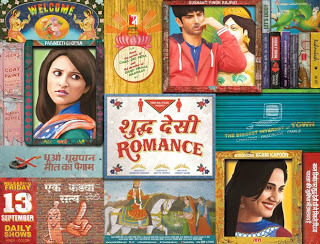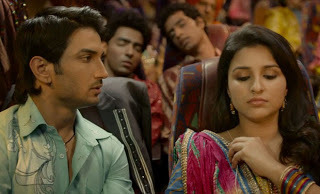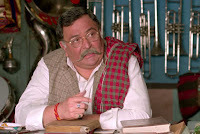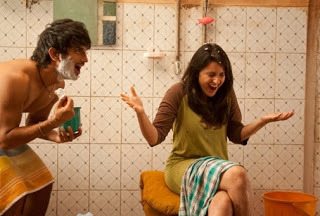Game of thrones: scattered notes on Shuddh Desi Romance

Maneesh Sharma’s new film Shuddh Desi Romance places societal double-standards against individual hedonism and the reluctance to take on responsibility. It features young, relatively un-rooted people who have freedoms that you don’t usually associate with small-town Indians, but who may not yet have developed the emotional resources to use those freedoms well. And it is an affectionate depiction of a world where people are constantly slipping and sliding in matters of the heart; or “phisal gayo re”, as the song lyrics – set to images of unsteady monkeys and pigeons – have it.
- It is also a film about talking and analysing and counter-analysing, one that opens with a monologue by Raghu (Sushant Singh Rajput) about Indian society’s many hypocrisies when it comes to love and marriage: why can’t two people be left alone to work out their own romantic issues, without everyone else jumping on their back like Betaal did to Vikram? How ironical it is to constantly be told to “settle down” despite the fact that the country itself hasn’t been able to settle its larger issues with its sibling-neighbour since 1947! These are reasonable points, but already one might suspect Raghu of being a little self-serving, a little reluctant to face the real implications of being in a relationship; we pick up on his likeability and sincerity, but also his callowness. And we will understand these qualities better as the story progresses.
 In any case, we soon get a firsthand view of the hypocrisies he speaks of: on the eve of his own arranged marriage, he finds himself in a romantic situation with a girl who has been hired to play the role of his sister in a fake baaraat. The over-eager Raghu and the curt Gayatri (Parineeti Chopra) go together like chalk and cheese (or maybe, as the film suggests in a later scene, like coffee and gulab jamun), but there is something very believable about the scene where they (literally) spend the night together while traveling in the baaraatiyon waali bus. It begins with him telling her “Please be comfortable”, but there is also a quick and inappropriate “I don’t mind” – said in the croaky voice of an oversized teen – when she sarcastically wonders if he plans to marry her. And then, an apparently spontaneous peck on Gayatri’s cheek leads to an awkward bout of lip-locking, or at least lip-grazing, while other mercenary baaraatis snore away in the background. Jaideep Sahni’s writing and the fine performances of Chopra and Rajput make all this work, even though it may not have seemed very convincing on paper.
In any case, we soon get a firsthand view of the hypocrisies he speaks of: on the eve of his own arranged marriage, he finds himself in a romantic situation with a girl who has been hired to play the role of his sister in a fake baaraat. The over-eager Raghu and the curt Gayatri (Parineeti Chopra) go together like chalk and cheese (or maybe, as the film suggests in a later scene, like coffee and gulab jamun), but there is something very believable about the scene where they (literally) spend the night together while traveling in the baaraatiyon waali bus. It begins with him telling her “Please be comfortable”, but there is also a quick and inappropriate “I don’t mind” – said in the croaky voice of an oversized teen – when she sarcastically wonders if he plans to marry her. And then, an apparently spontaneous peck on Gayatri’s cheek leads to an awkward bout of lip-locking, or at least lip-grazing, while other mercenary baaraatis snore away in the background. Jaideep Sahni’s writing and the fine performances of Chopra and Rajput make all this work, even though it may not have seemed very convincing on paper.- What follows is an improbable romance, but also the intellectualising of romance: the two of them – Gayatri especially – spend a lot of time dissecting what they are doing, rather than staying in the moment; they struggle to find a balance between giving free rein to their feelings, and trying to work out what is good for everyone in the long run. Some of this is in the tradition of romantic talkathons like Before Sunrise , or even a Woody Allen film where characters directly address the viewer, self-consciously investigating their own motivations and actions to a point where you wonder if they will ever actually get anything done. Even the song lyrics comment on the “silliness” of “hamaari love life”, and concede that the lovers talk a great deal – “lambi lambi baatein hain”.
– Of course, this motif of Talk, Talk, Talk, Analyse, Analyse, Analyse is at the other extreme from the workings of the traditional Indian arranged marriage, which is built on the idea of not thinking too much but accepting, going with the flow and hoping for the best. But it is also a funny counterpoint to a more conventional, less overtly cerebral type of movie romance represented by older Yash Raj Films productions like Kabhi Kabhie and Chandni , tunes from
 which occasionally play on the soundtrack of Shuddh Desi Romance. Both those films starred a much earlier avatar of Rishi Kapoor, who has a grand old time here as the jovial head of Goyal Caterers, willing to lend a sympathetic ear when required but also bewildered by the attitude of today’s youngsters to love and marriage. Goyal, a saltier, less refined version of the enterprising wedding planners in Sharma’s first film
Band Baaja Baaraat
, worries that the institution of marriage may have no future – not because he has ultra-conservative views on the subject (he benignly waves two adulterous lovers into the next room when he needs the space for a discussion with Raghu), but because it will affect his business.
which occasionally play on the soundtrack of Shuddh Desi Romance. Both those films starred a much earlier avatar of Rishi Kapoor, who has a grand old time here as the jovial head of Goyal Caterers, willing to lend a sympathetic ear when required but also bewildered by the attitude of today’s youngsters to love and marriage. Goyal, a saltier, less refined version of the enterprising wedding planners in Sharma’s first film
Band Baaja Baaraat
, worries that the institution of marriage may have no future – not because he has ultra-conservative views on the subject (he benignly waves two adulterous lovers into the next room when he needs the space for a discussion with Raghu), but because it will affect his business. – Part of the song “Tere Mere Beech Mein” is shot in a bathroom, as Raghu and Gayatri soak clothes together in a bucket. This is a cosy view of the everyday side of their live-in relationship, but in a couple of shots you can see the toilet seat in the background too. Such framing might be unusual in most romantic films, but toilets are crucial things in the Shuddh Desi Romance universe. A character takes a bathroom break so she can smoke a cigarette (and uses the opportunity to talk to us about what’s going on in her mind). The repeated theme of people using the bathroom excuse when they want to flee their own weddings is used for broad comedy (there is a funny moment involving garish shaadi lights twinkling merrily in the background when the discovery of such an escape is made), but it also has a clear symbolic function in a story where people are constantly
 trying to “purge” themselves of emotional commitment. As the narrative twists and turns, and the main characters try to work out what they really want, a giant bog (sorry!) of paranoia and recrimination builds up, and it must be got rid of for progress to occur. (Think of the dual meanings of catharsis.) I may have become obsessed with the toilet theme, because in a late scene I was looking at the ornate seats for the bride and the groom at a wedding function and thinking of the slangish use of “throne”. Chalte Phirte Shauchalya (a dramatic translation of “Mobile Toilets”, seen in one shot) might have been an alternate title for this film.
trying to “purge” themselves of emotional commitment. As the narrative twists and turns, and the main characters try to work out what they really want, a giant bog (sorry!) of paranoia and recrimination builds up, and it must be got rid of for progress to occur. (Think of the dual meanings of catharsis.) I may have become obsessed with the toilet theme, because in a late scene I was looking at the ornate seats for the bride and the groom at a wedding function and thinking of the slangish use of “throne”. Chalte Phirte Shauchalya (a dramatic translation of “Mobile Toilets”, seen in one shot) might have been an alternate title for this film.– Throughout, there is a deliberate repetition of situations, and even specific dialogue – from relatively mundane things (such as Raghu massaging the guilt of American tourists by selling them garments made by “orphans of the Iraqi war”) to the more central events involving the three protagonists. (Vaani Kapooor plays the girl who Raghu dumps at the altar.) This repetition emphasises the circularity of these characters’ lives, and suggests that to grow in life and love, they need to get out of the little traps they have set for themselves. As the writer, Sahni will fittingly get much of the credit for the script and how it is structured, but it’s hard not to see a link with Maneesh Sharma’s earlier work. I haven’t seen The Ladies vs Ricky Behl, but the excellent Band Baajaa Baaraat was a similar examination of commitment-phobia, coming of age and an almost accidental liaison deepening into something more profound.
– Based on what I’ve seen so far, I like Sharma’s direction of young actors. The performances of the three leads here, and those of Anushka Sharma and Ranveer Singh in Band Baajaa Baaraat, reminded me of what Naseeruddin Shah said to me in this conversation, about a more relaxed, less mannered acting style coming into American film in the 1950s because of the influence of television – “Something like that is happening in India now. Besides, actors of today are photographed almost from the moment they are born. The camera is no longer an object of terror for them, the way it used to be for us.” Of course, that also depends on the film in question: the casual, naturalistic dialogue in Shuddh Desi Romance plays a big part in facilitating a specific type of performance. (This film doesn’t use hand-held cameras to the degree that Band Baajaa Baaraat did, but one feels like it easily could have.)
- And to end with the least interesting part of any such write-up: did I like the film as a whole? Yes, though the repetition and the talkiness became excessive in the second half, and the final 20 minutes or so didn’t sustain my interest. Like so many other recent Hindi films, this one doesn’t quite know how or when to end, but it still has plenty of charming moments, and some good bathrooms.
Published on September 09, 2013 06:12
No comments have been added yet.
Jai Arjun Singh's Blog
- Jai Arjun Singh's profile
- 11 followers
Jai Arjun Singh isn't a Goodreads Author
(yet),
but they
do have a blog,
so here are some recent posts imported from
their feed.



